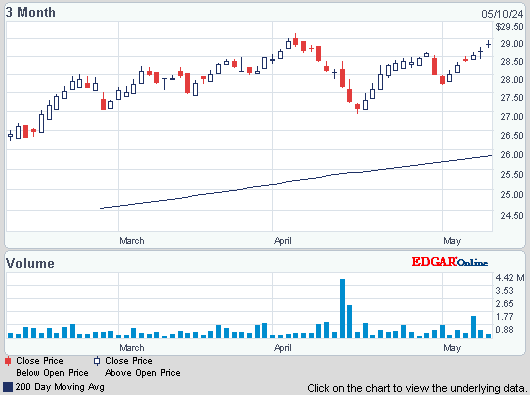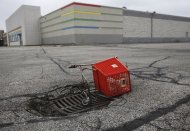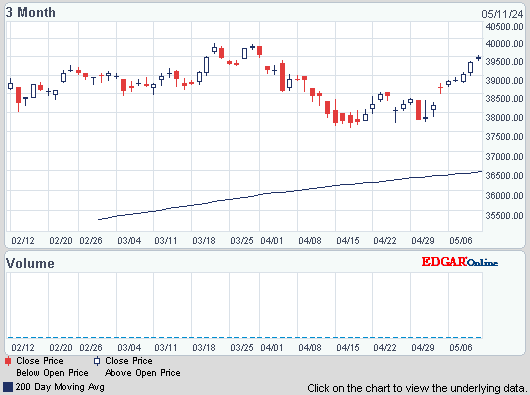Dow was up 8, decliners ahead of advancers 3-2 & NAZ fell 14. The MLP Index dropped a very large 5 to the 453s & the REIT index fell a fraction to below 300. Junk bond funds were mixed & Treasuries gained, bringing the yield on the 10 year Treasury to its lowest level in 5 months. Oil fell,
trimming the biggest weekly increase since Jun, as the US
economy grew less than expected in Q1. Gold advanced on the same news.
AMJ (Alerian MLP Index tracking fund)


Photo: Bloomberg
Economic growth regained speed in Q1, but not as much as expected, heightening fears an already weakening economy could struggle to cope with deep gov spending cuts & higher taxes. GDP expanded at a 2.5% annual rate, according to the Commerce Dept, after growth nearly stalled at 0.4% in Q4. A 3.0% growth pace was expected. Part of the pick-up in activity reflected farmers' filling up silos after a drought last summer decimated crop output. Removing inventories, the growth rate was a tepid 1.5%. Still, most areas of the economy contributed to growth, with the exception of gov, the trade sector & investment by businesses in offices & other commercial buildings. While consumer spending increased solidly, it came at the expense of saving, which does not bode well for future growth. The GDP report offers ammunition for the Federal Reserve to maintain its monetary stimulus. When it meets next week, it's widely expected to keep purchasing bonds at a pace of $85B a month.
Growth in U.S. Trails Forecasts as Defense Spending Falls

Photo: Bloomberg
Consumer sentiment eased in Apr as Americans remained concerned about their employment & financial prospects. The Thomson Reuters/University of Michigan's final reading on the overall index on consumer sentiment fell to 76.4 from 78.6 in Mar, although it topped expectations for 73.2. It also was an improvement from the preliminary reading for Apr of 72.3. The barometer of current economic conditions fell to 89.9 from 90.7, while the gauge of consumer expectations slipped to 67.8 from 70.8. Just 23% of consumers anticipated a decline in the unemployment rate during the coming year, while 75% expected an unchanged or higher jobless rate. Consumers continued to take a grim view of gov economic policy, with just 9% rating policy favorably, slightly above the all-time low of 4%. The outlook for vehicle & home purchases remained positive, with 8 out of 10 viewing home buying conditions as favorable. But the overall index measuring buying conditions for durable goods fell to 137 from 140. The survey's one-year inflation expectation fell to 3.1% from 3.2%, while the survey's 5-10-year inflation outlook also edged down to 2.9% from 2.8%. Not good when combined with the GDP report.
Consumer Sentiment in U.S. Fell to Three-Month Low in April

Photo: Bloomber
Americans are allocating a smaller share of their spending to investment-related fees since the recession, a sign they are still wary of returning to financial markets even as stocks trade near record highs. Spending on expenses including securities commissions, investment advice & custodial services totaled about $151 B in Feb at a seasonally-adjusted annual rate, the Commerce Dept said. That accounted for 1.3% of total personal consumption, matching the average since the 18-month recession ended in Jun 2009, compared with 1.6% in the 12 months before the downturn started. Mar figures are scheduled to be released on Mon. Outflows from US-based stock mutual funds totaled about $1.4B in Feb & have been negative for 36 out of 44 months since the recession ended, according to the Investment Company Institute. Investing in the stock market used to be a “no-brainer” before the recession. Not any more.
Americans Spend Less on Finance as Doubt Lingers: EcoPulse
Stocks are behaving fairly well considering the gloomy economic news. But that news is serious & a strong indication that there are more problems out there than Dow near an all time record indicates. Some traders may be away on a long weekend. But when they return next week, there should be more selling. MLPs were hit with their 2nd day of losses, to be expected after an unprecedented run up during the last 11 months.
Dow Jones Industrials

AMJ (Alerian MLP Index tracking fund)
Treasury yields:
U.S. 3-month |
0.048% | |
U.S. 2-year |
0.221% | |
U.S. 10-year |
1.674% |
| CLM13.NYM | ...Crude Oil Jun 13 | ...93.02 | (0.7%) |
| GCJ13.CMX | .....Gold Apr 13 | ....1,472.90 | (0.7%) |

Photo: Bloomberg
Economic growth regained speed in Q1, but not as much as expected, heightening fears an already weakening economy could struggle to cope with deep gov spending cuts & higher taxes. GDP expanded at a 2.5% annual rate, according to the Commerce Dept, after growth nearly stalled at 0.4% in Q4. A 3.0% growth pace was expected. Part of the pick-up in activity reflected farmers' filling up silos after a drought last summer decimated crop output. Removing inventories, the growth rate was a tepid 1.5%. Still, most areas of the economy contributed to growth, with the exception of gov, the trade sector & investment by businesses in offices & other commercial buildings. While consumer spending increased solidly, it came at the expense of saving, which does not bode well for future growth. The GDP report offers ammunition for the Federal Reserve to maintain its monetary stimulus. When it meets next week, it's widely expected to keep purchasing bonds at a pace of $85B a month.
Growth in U.S. Trails Forecasts as Defense Spending Falls

Photo: Bloomberg
Consumer sentiment eased in Apr as Americans remained concerned about their employment & financial prospects. The Thomson Reuters/University of Michigan's final reading on the overall index on consumer sentiment fell to 76.4 from 78.6 in Mar, although it topped expectations for 73.2. It also was an improvement from the preliminary reading for Apr of 72.3. The barometer of current economic conditions fell to 89.9 from 90.7, while the gauge of consumer expectations slipped to 67.8 from 70.8. Just 23% of consumers anticipated a decline in the unemployment rate during the coming year, while 75% expected an unchanged or higher jobless rate. Consumers continued to take a grim view of gov economic policy, with just 9% rating policy favorably, slightly above the all-time low of 4%. The outlook for vehicle & home purchases remained positive, with 8 out of 10 viewing home buying conditions as favorable. But the overall index measuring buying conditions for durable goods fell to 137 from 140. The survey's one-year inflation expectation fell to 3.1% from 3.2%, while the survey's 5-10-year inflation outlook also edged down to 2.9% from 2.8%. Not good when combined with the GDP report.
Consumer Sentiment in U.S. Fell to Three-Month Low in April

Photo: Bloomber
Americans are allocating a smaller share of their spending to investment-related fees since the recession, a sign they are still wary of returning to financial markets even as stocks trade near record highs. Spending on expenses including securities commissions, investment advice & custodial services totaled about $151 B in Feb at a seasonally-adjusted annual rate, the Commerce Dept said. That accounted for 1.3% of total personal consumption, matching the average since the 18-month recession ended in Jun 2009, compared with 1.6% in the 12 months before the downturn started. Mar figures are scheduled to be released on Mon. Outflows from US-based stock mutual funds totaled about $1.4B in Feb & have been negative for 36 out of 44 months since the recession ended, according to the Investment Company Institute. Investing in the stock market used to be a “no-brainer” before the recession. Not any more.
Americans Spend Less on Finance as Doubt Lingers: EcoPulse
Stocks are behaving fairly well considering the gloomy economic news. But that news is serious & a strong indication that there are more problems out there than Dow near an all time record indicates. Some traders may be away on a long weekend. But when they return next week, there should be more selling. MLPs were hit with their 2nd day of losses, to be expected after an unprecedented run up during the last 11 months.
Dow Jones Industrials









No comments:
Post a Comment